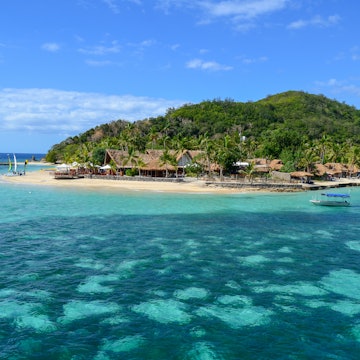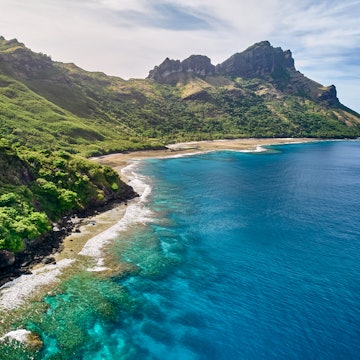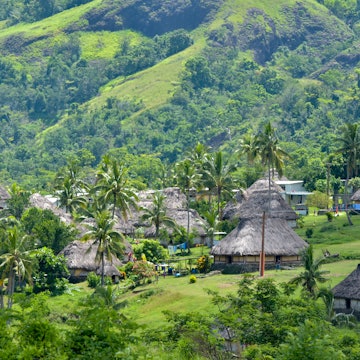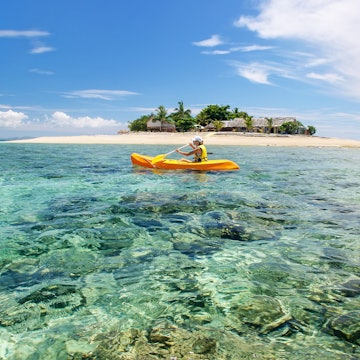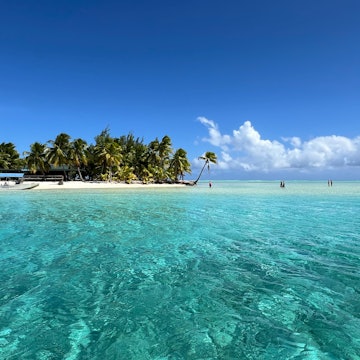
The best ways to travel around in Fiji



A small boat transporting people between the Yasawa Islands, Fiji. rui vale sousa/Shutterstock
With 333 islands to explore, getting around the South Pacific island nation of Fiji might sound daunting, but a bit of patience and flexibility makes it a whole lot easier.
The main island of Viti Levu, where all international flights arrive, is well-connected with bus and taxi services, while regular ferries and domestic flights link many of the most popular islands. For those eager to explore further afield, long-distance ferries, and local boat charters make the more remote islands of Fiji accessible.
Ready to plan your trip? These are the best ways to get around Fiji.

Navigate the bigger islands by car
If you want to experience Fiji’s highlights at your own pace, renting a car is the way to go. You’ll have the freedom to explore beyond the main routes, skip the bus schedules, and easily reach remote spots without worrying about how to get back.
Driving is on the left, and most main roads are paved, though potholes are common (especially during the rainy season). Traffic is generally light across the country, except in Suva, Nadi, and Lautoka, or when heavy rain slows things down. The national speed limit maxes at 80km/h on the highways, but you’ll want to drive slower in low light as it’s common for animals and people to share the road.
Avis and Europcar are two of the best-known rental car providers in Fiji with outposts at Nadi International Airport, Denarau Island, and the capital city of Suva. Coastal Rental Cars also has a wide fleet available for hire in Suva and Nadi.
The main road that wraps around the perimeter of Viti Levu makes for a scenic ride, meandering along the coast through lush rainforest and alongside grasshopper-green sugar-cane fields. You’ll also pass through villages with fruit stands and perfectly manicured gardens as you do the circuit. The islands of Vanua Levu, Ovalau, and Taveuni are also best explored with your own set of wheels.
Motorcycles and scooters aren’t common in Fiji, and you’ll have a tough time finding rentals outside of Nadi. Go Dirty Tours in Nadi is one of the few places with two-wheelers for hire.
Local tip: Driving in Fiji can be unpredictable, and cell service is patchy in many areas. Download an offline map before you head out and add an extra 25% to the estimated travel time.

Take the bus like a local
If you’re traveling on a budget or fancy getting a taste of local life, buses are the best way to get around Fiji’s main islands. Around 95% of the country’s roads are found on Viti Levu and the neighboring island of Vanua Levu with frequent bus services running around both.
There are two types of bus services, colloquially known as "city" buses and "express" buses. Officially, travelers need an eTransport card purchased from a Vodafone store or from the main bus stations to pay for bus rides. Unofficially, drivers are happy to arrange cash payments or issue temporary cards. City buses generally run shorter distances, have open windows, and bench seating. Fares start from just FJ$1 for local trips, running up to FJ$7 for longer trips.
Sunbeam Transport, Pacific Transport and Coral Sun have air-conditioned "express" buses that run longer journeys with limited stops. The 4-hour ride between Nadi and Suva will cost around FJ$28.
Minibuses – large vans with license plates that start with LM – are ubiquitous around the larger islands and are notorious for speeding. You’ll find them parked at or near the major bus stations. They depart once a handful of passengers are onboard and will pickup and drop-off along the side of the road based on demand.
Local tip: Don’t be surprised if a seatmate offers to share a snack or drink on a long bus ride, it’s considered good etiquette! Make friends for the journey by bringing and sharing your own.

Find flexibility by taking a taxi
Many residents of Suva and Nadi lament that there are more taxis than passengers buzzing around the city. Compared to many other South Pacific destinations, taxis are affordable on Viti Levu, with prices starting at FJ$2–5 and ticking over FJ$1 per kilometer traveled. These taxis are easy to flag from the road in the more populated areas and best arranged by your accommodations in less populated areas. Airport pickups start at a higher fare.
Metered taxis will have license plates that begin with a LT, ND or LK and have the telltale taxi sign atop their vehicle. Always ask drivers to turn on their meter. Sometimes, you might be picked up by a vehicle with a license plate starting with LH. These are technically transfer companies and may charge a flat fee – it’s wise to agree on a fare before setting off.
Local tip: Estimate the fare for a destination by adding around FJ$2 to the distance in kilometers traveled. If you find a driver you trust, save their number for future trips.

Soak up Fiji’s scenery by boat or ferry
Hop off the main island and explore the other islands by traveling via a ferry or boat. Fast ferries and resort-operated vessels connect Port Denarau on Viti Levu to the popular Mamanuca and Yasawa Islands. The Yasawa Flyer steams daily along the chain, stopping at around a dozen islands. Tickets are easily purchased online through South Sea Cruises or arranged through your accommodations.
If you’ll be visiting multiple islands, consider getting the hop-on-hop-off Bula Pass, valid for up to 15 days of travel.
Other islands, like Ovalau, Taveuni, Vanua Levu, and Kadavu, are also served by ferry routes, though their schedules tend to be less consistent and can change without much notice. Many of these ferries run overnight.
Local tip: Once on the islands, ask around about getting a lift over to nearby islands. Often these will be local motorboats with little to no safety equipment. Only venture out in calm conditions.

Island hop on a domestic flight
The fastest and most convenient way to connect to the outer islands is on a domestic flight. Most flights depart from or route though Suva and Nadi. Fiji Airways has a 30-minute flight between Suva and Nadi, and connects to Taveuni, Vanua Levu, Kadavu and a handful of the smaller islands. Northern Air flies to Vanua Levu, Taveuni and Moala.
Some of the five-star stays have their own private flight, sea plane or helicopter services connecting you to their island in style.
Local tip: Domestic flights are typically on small aircrafts with limited luggage space for surfboards or large sporting equipment. Pack according to their restrictions.
Accessible transport
The sidewalks around Fiji are generally not friendly to wheelchairs, mobility scooters or strollers. High curbs and rough, unpaved surfaces are common. Finding accessible transport options on land and at sea is also a struggle, so it’s best to call operators beforehand to discuss what arrangements can be made to facilitate your journey.
Tourist Transport Fiji is one of the only transfer firms with a wheelchair-accessible vehicle and its customized minibus includes an electric lift. On the accommodation front, some of the larger resorts feature disability-friendly rooms and thoroughfares, but you’ll want to call and confirm before booking.
Local tip: Ferries are often met by smaller transfer boats, which can be tricky to board for travelers with limited mobility. For easier accessibility and smoother travel, Viti Levu is generally the most suitable island to explore.






